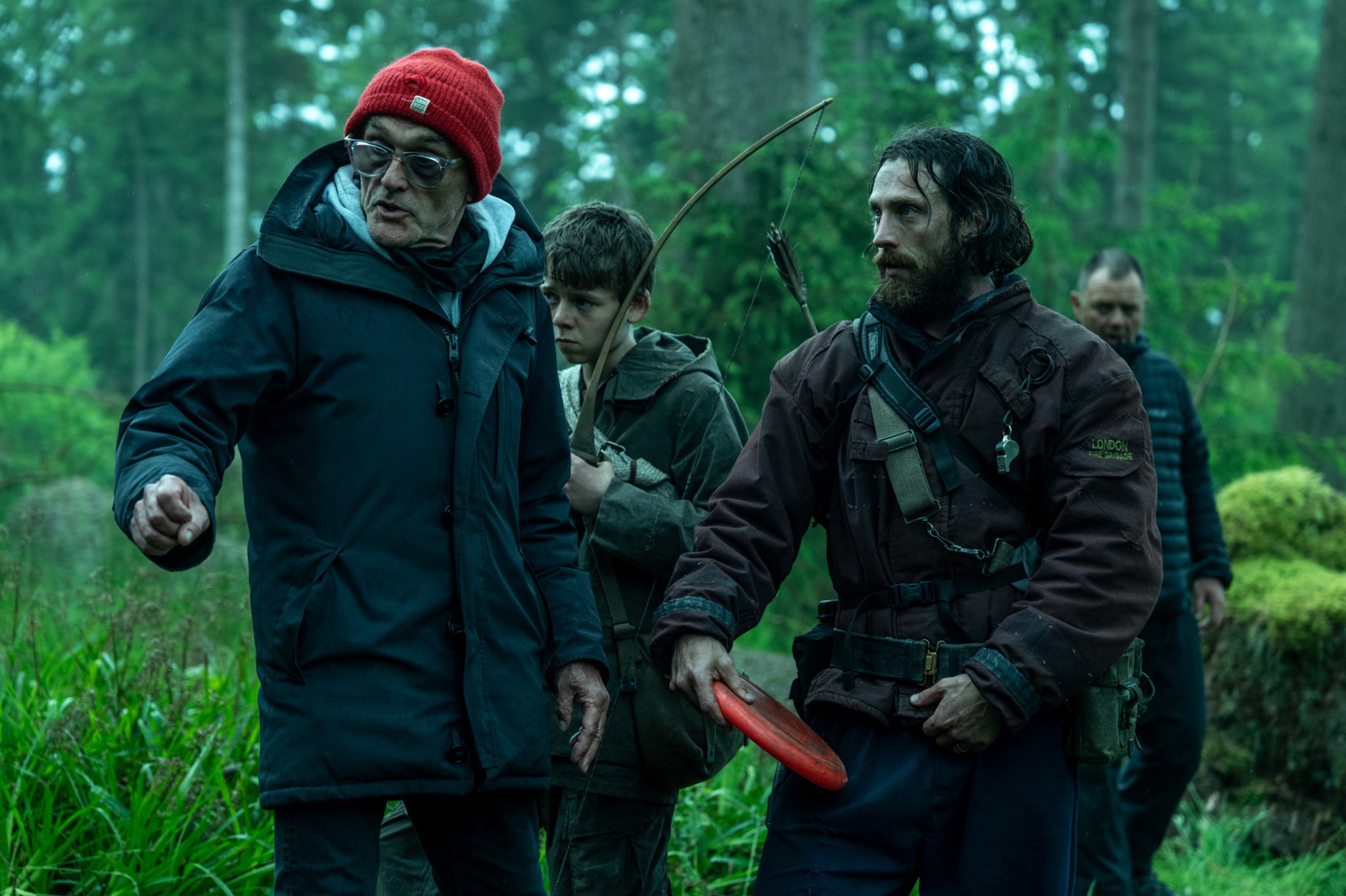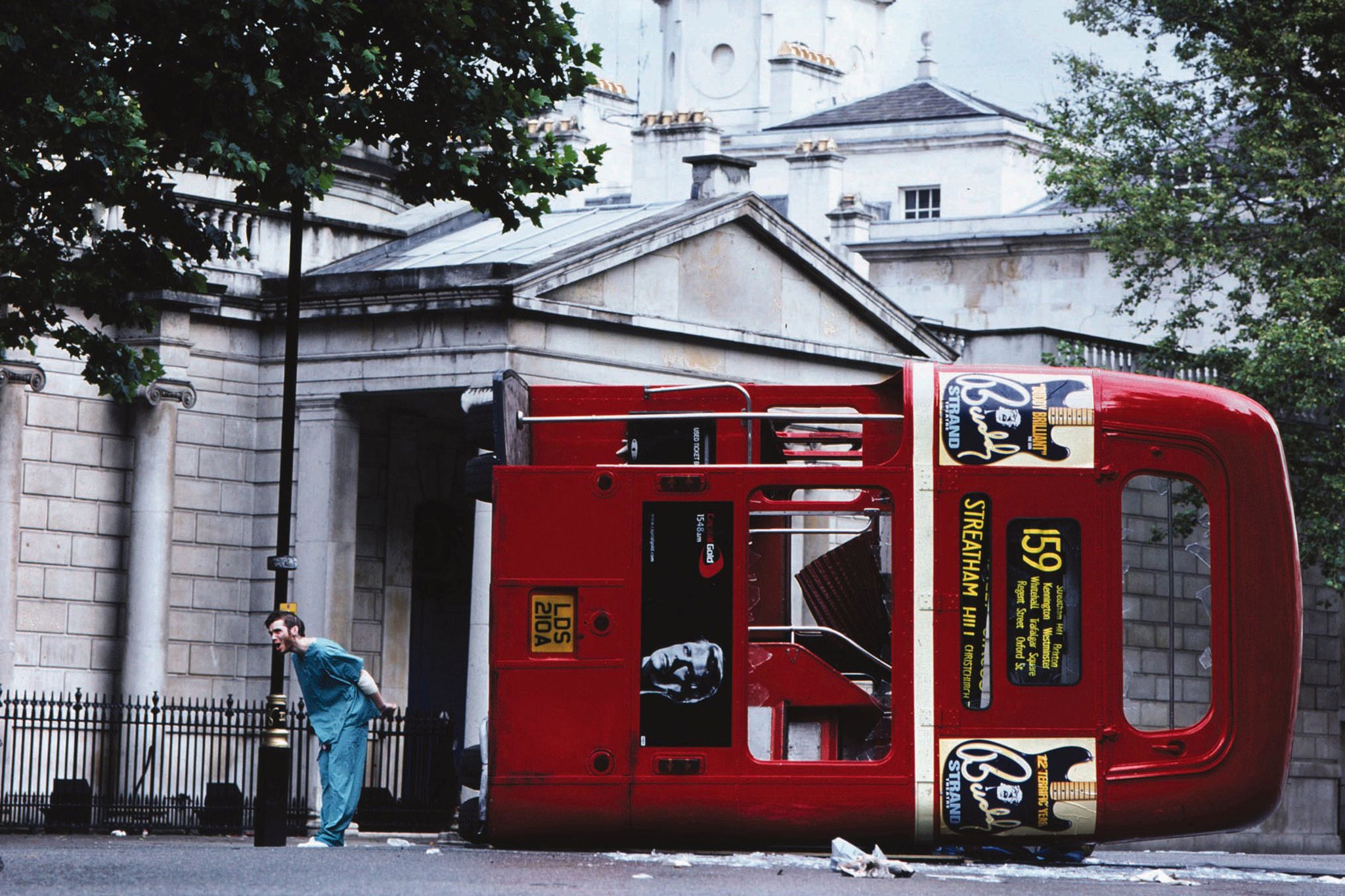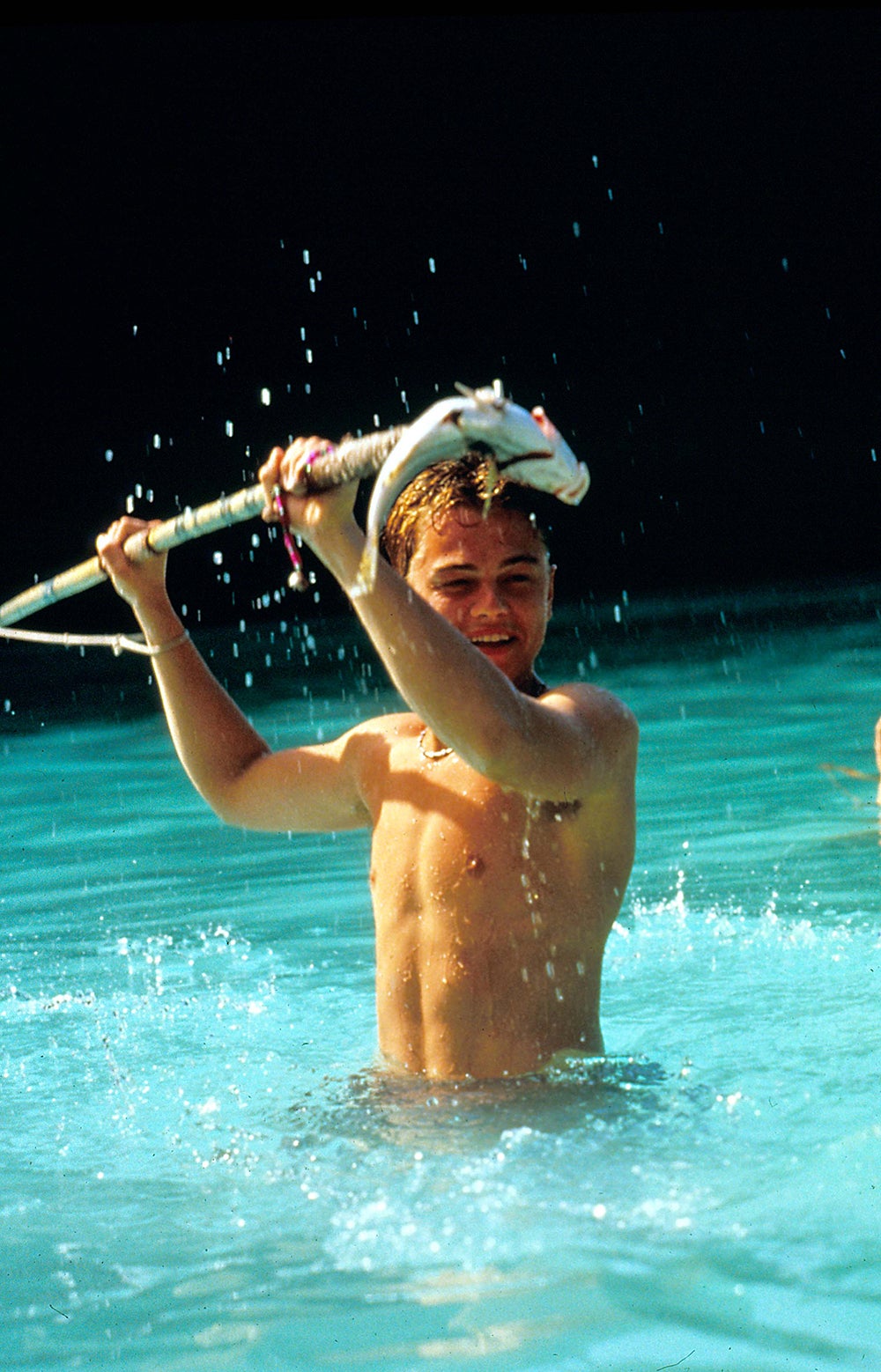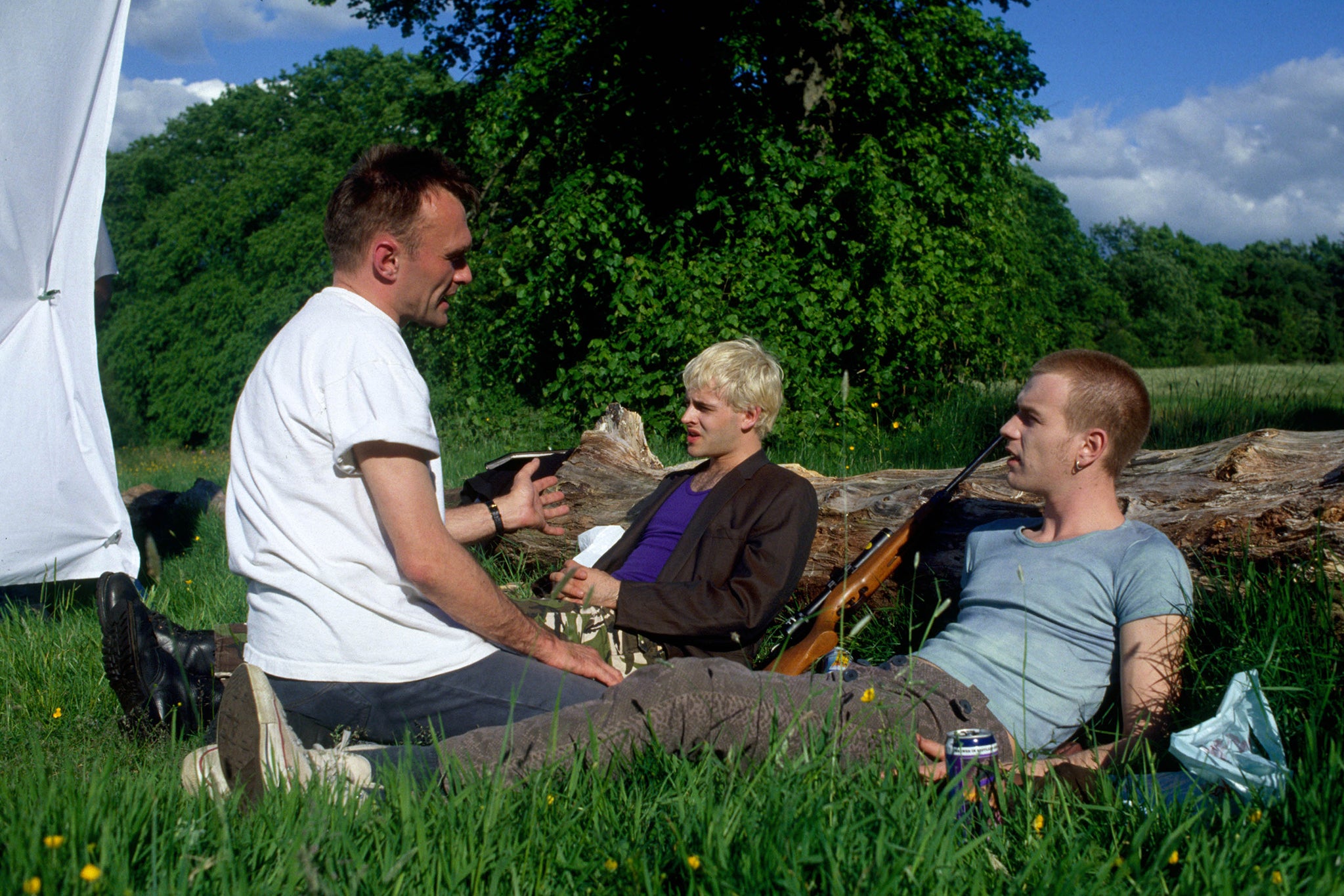
For more than 30 years, in flashy, generally two-hour-long increments, Danny Boyle has made Britain seem like the coolest place in the world. His Britain is one of beautiful movie stars, pop-music montages and frenetic style. Think Ewan McGregor sliding out of a grotty Edinburgh toilet in Trainspotting. Or Cillian Murphy wandering barren London streets in 28 Days Later. It’s The Beach, weird pills, casual sex and “Born Slippy”. In this week’s 28 Years Later, his brutal and genre-shifting sequel to the 2002 zombie smash, innards splatter across a late-Nineties television set as it broadcasts Teletubbies. Children scream in terror. The choral, hip-hop din of Young Fathers blares on the soundtrack. Tinky-Winky does a curtsy. It’s enough to make you want to stand up and sing the bloody national anthem.
Sitting across from him – and his frequent collaborator Alex Garland – in a London hotel suite, I’ve just told him about this Boyle cool; this ability of his to present Britain as a bit less grey, naff and enraging than it often is. He gently chides me. “I’m loosely on the left,” he says. “And I think the only problem with the left is that we like to denigrate what we want to improve. Part of the danger of that is you don’t value what’s good about what we have.” Which is to say: yes, we sometimes stink, but good god are we capable of brilliance.
“I did this Olympics thing,” he continues, modestly, as if his role directing the staggeringly affecting opening ceremony of the 2012 event – remember its chimney stacks, its helicopter-jumping Queen Elizabeth and its Pink Floyd pig? – were about as ordinary as taking the bins out. “One of the things that exposes you to, and very intensely, is other people’s opinions of us. The value put upon what we have by countries all over the world is enormous, and it gets denigrated. There are values and decencies that should be cherished. That doesn’t mean we can’t improve. You must improve. And it’s particularly dangerous at the moment, because technologists who are not rooted in this country are intent on taking over – both in business and more philosophically. But I’m committed to holding on to the things that are good about this strange land we inhabit.”
Boyle is a slight, shiny wisp of a man, inexplicably 68 years old, and possessed of an incredible, almost childlike enthusiasm – imagine Disney’s Geppetto if he had a bit less hair. Boyle hasn’t exclusively worked in Britain, of course. There’s been his Steve Jobs biopic and, most notably, Slumdog Millionaire, his India-set drama that won him the Best Director Oscar in 2009. But it’s arguably his UK-focused works that have best stuck in the cultural memory. At least in his homeland, anyway. Perhaps he just gives us what we want to see. Look at 28 Years Later. You’ve got Jodie Comer, speaking thick, Cheryl Cole-inspired Geordie, gazing in wonder at the Angel of the North. What a lovely, wholesome image.
28 Years Later is, it should be said, not entirely wholesome entertainment. There are the requisite bits of spinal extraction, bullets to the brain and worm-eating, the bulk of the film set in an England now totally taken over by the virus that first decimated the country nearly 30 years earlier. But 28 Years Later is also not un-wholesome.
Fundamentally, it’s about a mother and son, Comer’s ambiguously ill Isla and young Spike (astounding 14-year-old newcomer Alfie Williams), who flee the safety of their inoculated compound in the Scottish Highlands in pursuit of a doctor who might have a cure. Isla flickers in and out of lucidity, while Spike – trained to kill by his father (Aaron Taylor-Johnson) – wavers between appropriate naivety and hardened, battle-weary strength. You will cry. Possibly more than once. Boyle admits that this particular strain of the plot has been kept quiet in the film’s promotional materials.
The James Bond team just got cold feet. Me and [screenwriter] John Hodge had an utterly romantic idea about what we could do with that franchise, and they just didn’t go for it
“Obviously, the core audience is a horror audience, and they’re concerned if too many reviews call it a weepie...” Boyle trails off, grimacing. “But the first film was actually very moving, too!” Remember poor Brendan Gleeson urging his young daughter to flee with Murphy and Naomie Harris after he’d been infected? “So it’s born out of the right instincts,” Boyle continues. “They’re just a bit worried [about selling it on that].” I did find the movie terrifying, too, I add. “Yeah, ‘you’ll weep with terror’,” Boyle jokes. “That’ll do.”
The new film has an interesting origin story. A sequel to the first film was never of too much interest to Boyle, or to Garland, then best known as the novelist behind The Beach – itself adapted to divisive effect by Boyle in 2000 – and now a successful filmmaker (Civil War, Ex Machina) in his own right. It’s why Garland’s loose ideas for a follow-up were folded into the pair’s 2007 film Sunshine, why neither Garland nor Boyle had enormous involvement in the mediocre, Americanised 2007 sequel 28 Weeks Later, and why the events of that movie are more or less swept under the rug in the new film.

“I think Danny and I are wary of sequels – distrustful even,” says Garland today, serving as the serious yin to Boyle’s jovial yang. “When a sequel was proposed previously, I doubted why I’d want to do it.” Not helping matters was that there were so many obstacles in the way of them making one on their own terms. For years, the rights to the franchise were in limbo, either being passed between different American film studios or left to collect dust on a shelf somewhere – it’s why 28 Days Later was always so hard to find on DVD (only a relatively small number of discs were printed in the mid-Noughties) and why it’s only recently hit streaming. “But then I realised the value of the fact that the rights reverted back to us,” Garland continues. “Something huge shifts at that point – the relationship between an original film and a sequel, why a studio would want a sequel, all sorts of things like that. They just change. And rather than shop [the rights], it allowed us a period of quiet where we were left to our own devices. And this is what we came up with.”
28 Years Later is the start of a proposed trilogy of new movies, the second of which has already been filmed – under the direction of Candyman’s Nia DaCosta – and is due for release in January. The third will be led once again by Murphy. “He’s our ace in the pack,” Boyle teases. As it stands, 28 Years Later ends on an irresistible cliffhanger, if one that forms undoubtedly the strangest and most unexpectedly horrifying last few minutes of a major studio film in recent memory. And if I elaborated any further on it, you probably wouldn’t believe me anyway.
“[The ending] is about reintroducing evil into what has been a compassionate environment,” Boyle explains. “I asked Alex right at the beginning [of the writing process] to tell me the nature of each of the films. He said that the first film is about the nature of family. The second film is about the nature of evil.”

How Boyle got away with it is down to the ethos he developed 25 years ago on the set of The Beach, in which Leonardo DiCaprio played a backpacker encountering enviable bohemia and dangerous madness on a secret Thai island. For Boyle, the experience taught him that you probably ought to fight for control of a project at the first whiff of trouble, or flee it altogether. Tales of The Beach’s difficult production – furious locals, numerous on-set accidents, paparazzi scrambling to find a post-Titanic Leo – are legendary by now, but Boyle says today that they were a tad overegged. “The Beach was wonderful for everyone – except for me,” he laughs. “The difficulties I had on it were personal, and had to do with size and scale. I look at directing like you’re a child with a sandpit – you want to maintain control of it, and you lose that sense of control when the thing becomes too big and unmanageable. And if you bring the wrong people in to help you with it, you will really lose control of it.”
Because of The Beach’s high budget, Boyle was ordered to give it a happier ending than Garland’s source material. And with just Shallow Grave, Trainspotting and the underrated if financially unsuccessful quasi-romcom A Life Less Ordinary under his belt, Boyle acquiesced. It’s something he won’t do today. “What I’ve learnt – especially with bigger films like 28 Years Later – is how to control it and to make sure you have the right people around you. And when those moments arrive where your control is threatened, I can spot it now much earlier and steer it away as politely as I can.” He cracks a smile. “Or if I have to be rude, I’ll be rude. Because I’ve had enough experience now to know that films and stories are precious things, and they have to be told in a way that best reflects what’s precious about them, not what people think is valuable about them.”
I’m curious, I ask, if this is what happened with James Bond. Boyle was all signed up to direct what would have been Daniel Craig’s final spin as 007 – which would ultimately become 2021’s No Time to Die – but dropped out in 2018 over supposed “creative differences” with its backers at MGM. Could he sense a burgeoning loss of control there?
“They just got cold feet about it,” he says. “Me and [screenwriter] John Hodge had an utterly romantic idea about what we could do with it, and they just didn’t go for it.” He shrugs. “They took a couple of ideas from it, which they’re entitled to do – they paid good money for it! But we walked away because they didn’t really want to fully engage with what we’d dreamt up.”

It seems strange that a studio would land Boyle and then fail to properly support his vision, but there’s always been a slight undervaluing when it comes to his significance in general. We certainly don’t have many like him in this country – real stylists and strictly commercial experimenters, whose work is always interesting if not always winning (remember his strange “what if the world was Beatles-less?” comedy Yesterday?). It’s always slightly baffled me, but I can’t help but wonder if it’s partly Boyle’s doing. He’s often modest to a fault, telling this newspaper back in 2019 that he doesn’t think he’s that good a director, and in 2022 raising eyebrows by declaring at a BFI screening of 28 Days Later that he’s “not sure the British are great filmmakers”.
“Yeah, I saw that!” interrupts Garland, his face suddenly flush with confusion. “What the f*** were you talking about? Alfred Hitchcock’s British. Ridley Scott’s British. Also, by the way, so are you!”
Boyle flaps his arms. “What I said was that I think we’re great pop musicians, and we lead the world in that.”
“David Lean?” Garland adds, still confused.
“Yeah, but these are historical figures! You can mention 20 American directors for each one of them. Whereas if you say to Americans, ‘Name the pop musicians, the pop creators,’ we’re right up there and dominant.”
Boyle turns back to me. “Listen, you’ve got to be honest about stuff like this. Some days I wake up and think I’m a great filmmaker. Other days I wake up and think, ‘F***ing hell – I’m terrible.’”
“You’re a great filmmaker,” Garland tells him.
“Doesn’t mean that we’re a great filmmaking country,” Boyle shoots back. “In fact, you’re one of the exceptions. If a dozen Alex Garlands turned up tomorrow, I might begin to reconsider. But until that happens, I don’t think there’s much of an argument.”

In his own Boyle-ish way, though, he’s able to spin even this into something vaguely patriotic.
“We’re not bulls***ters in this country,” he says, defiantly. “We’ve got this kind of clarity about what’s important and what isn’t, and a sense of humour that really punctures stuff. It comes from being a post-imperial power on the decline, whether people like it or not.”
Boyle becomes even more animated.
“It gives us a perspective. And it’s passed down in families and in schools. And that’s the reality. It’s what we are.”
Once again, I almost feel like standing up and singing the national anthem.
‘28 Years Later’ is in cinemas
Danny Boyle shares huge detail about ‘wild’ 28 Years Later ending
28 Years Later feels like being repeatedly bonked on the head by the metaphor hammer
28 Years Later boldly changes 28 Weeks Later plot twist within minutes
Danny Boyle: 28 Years Later Covid pandemic parallels were inevitable







